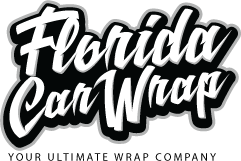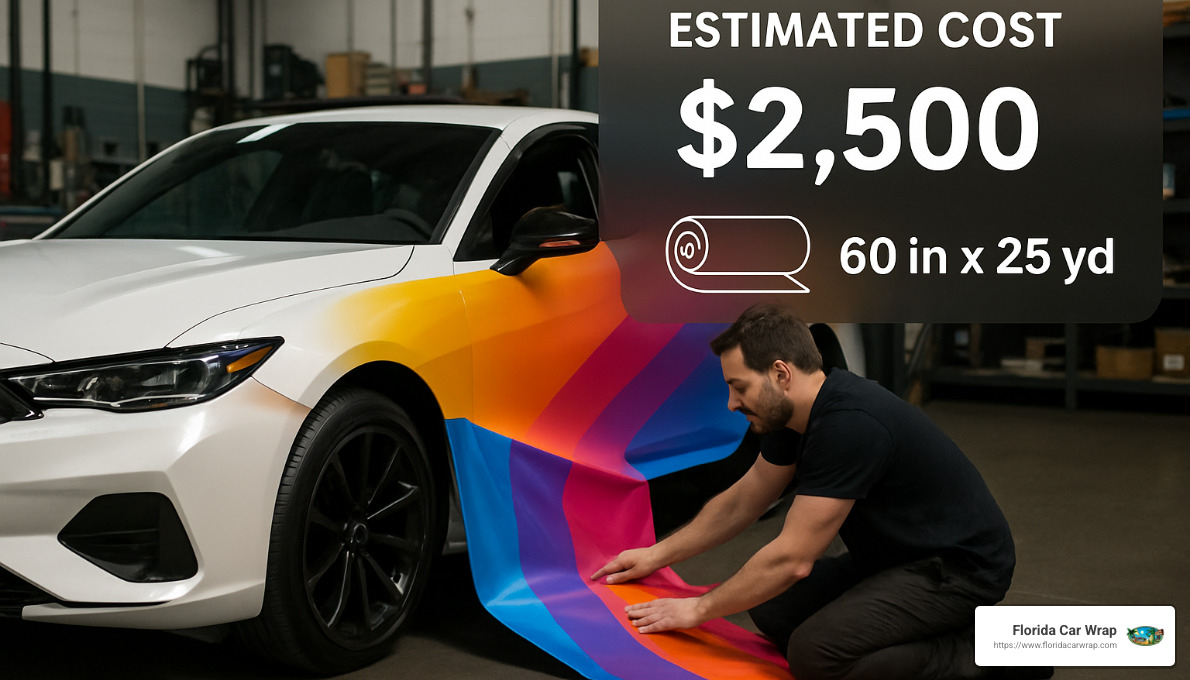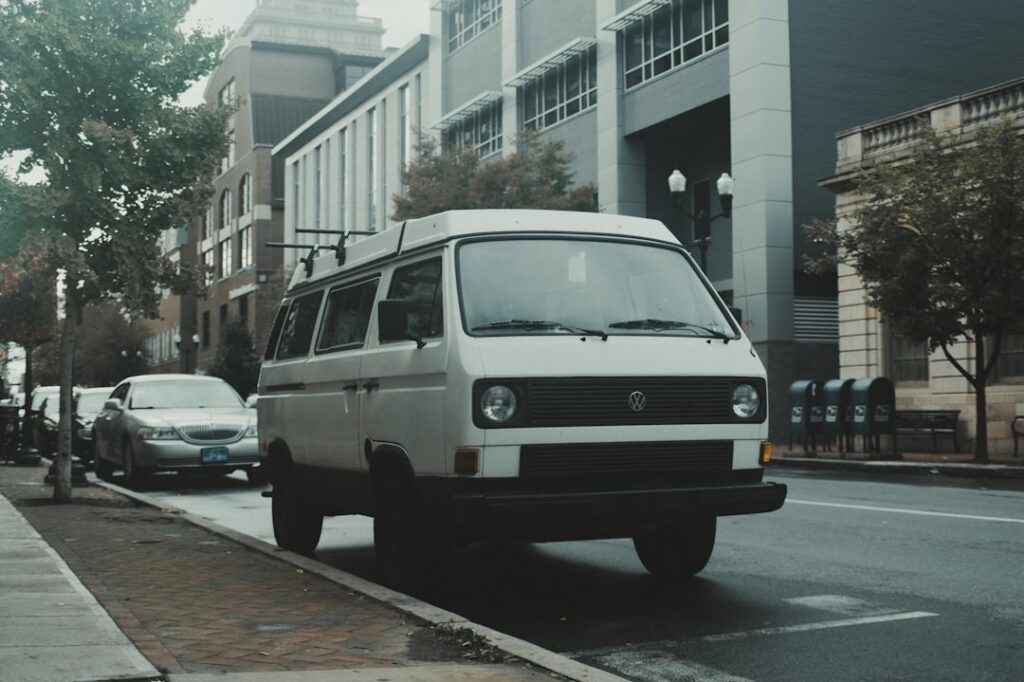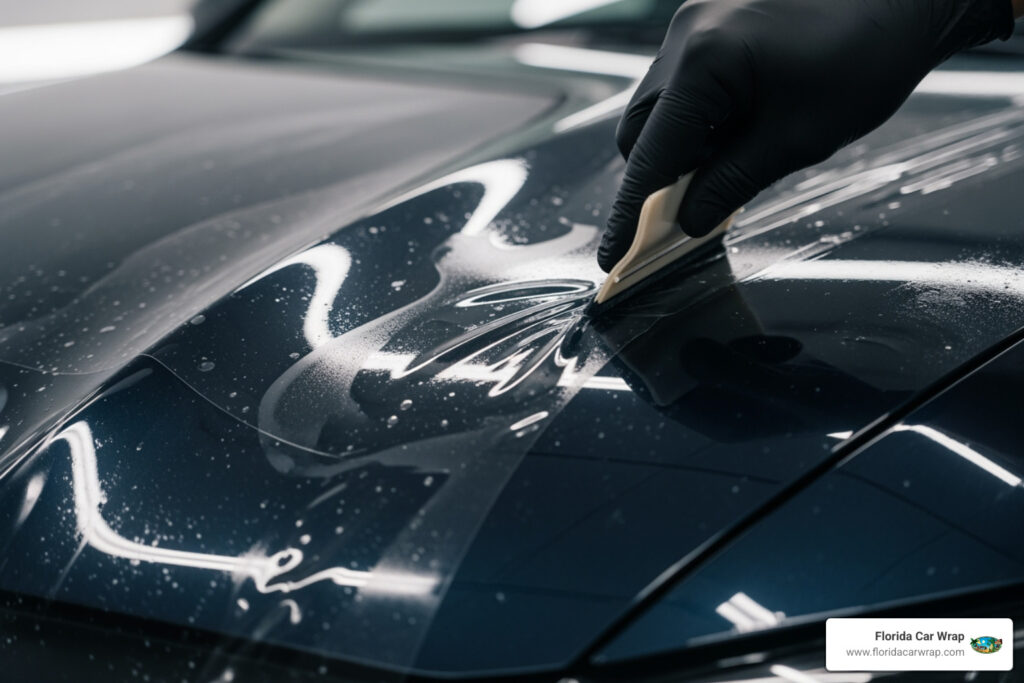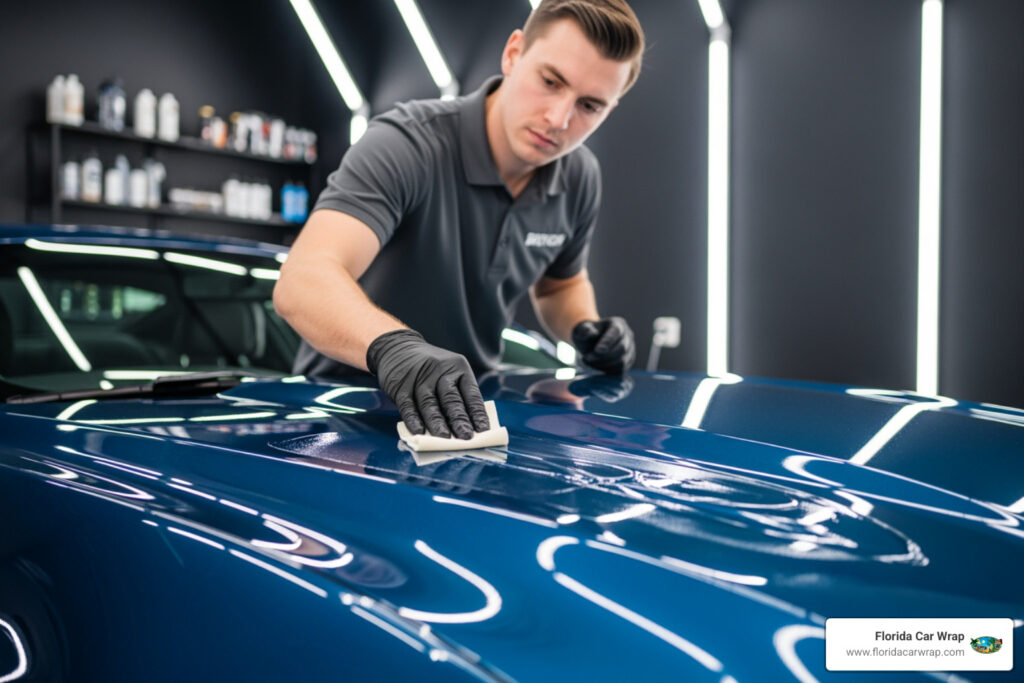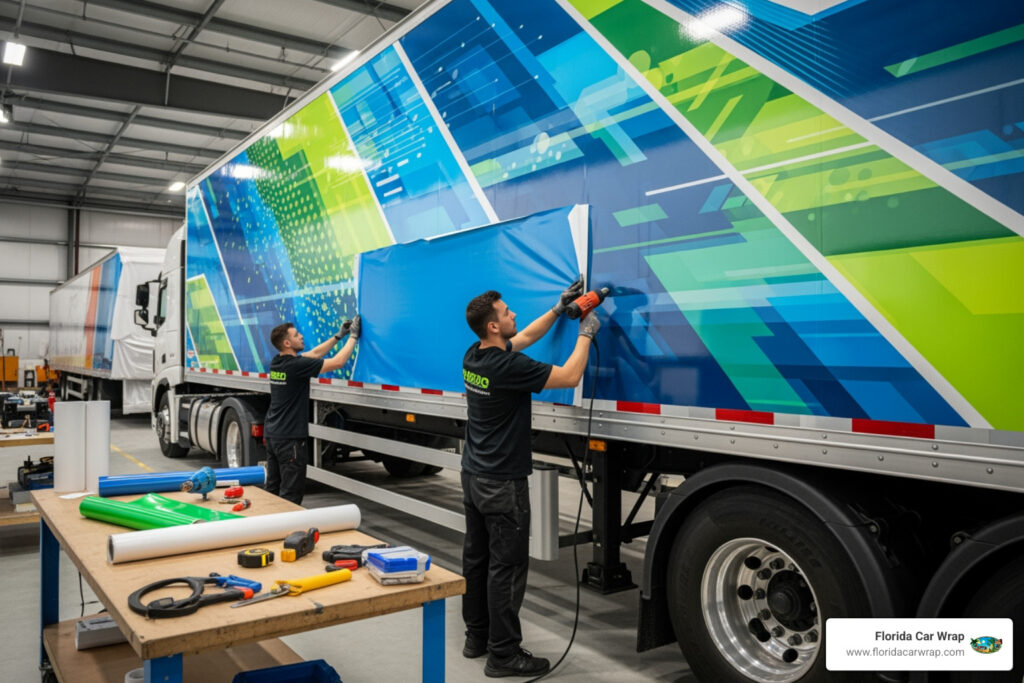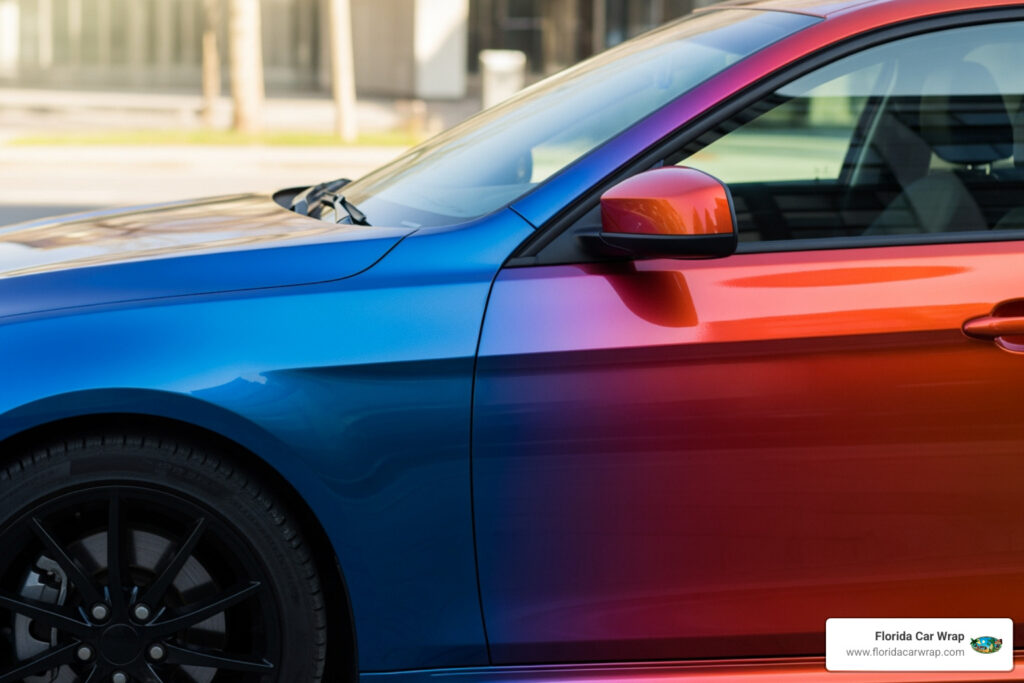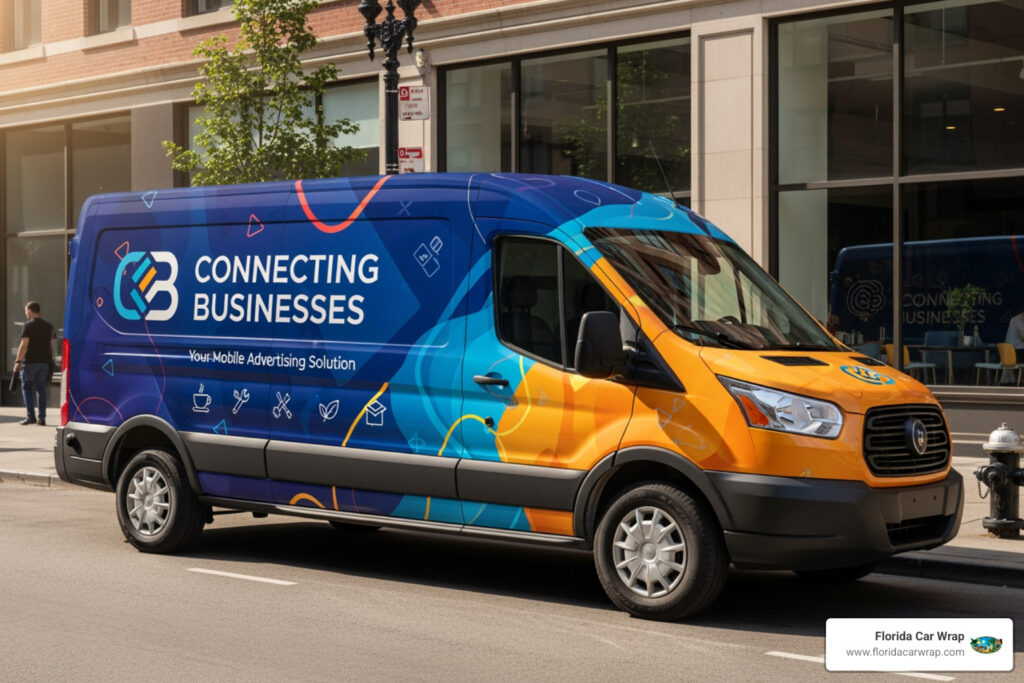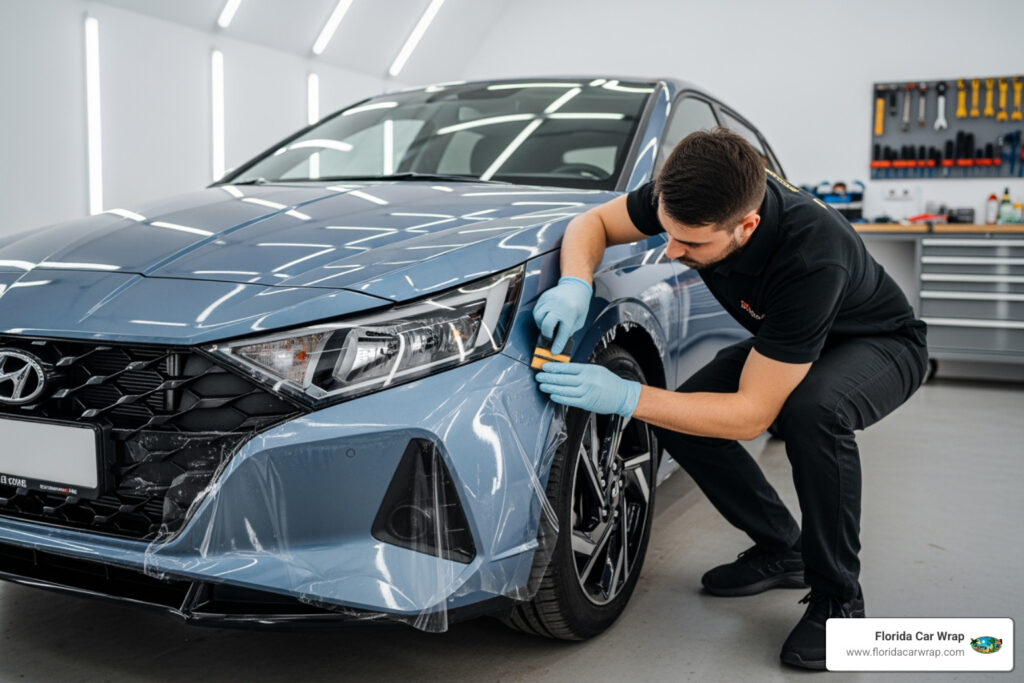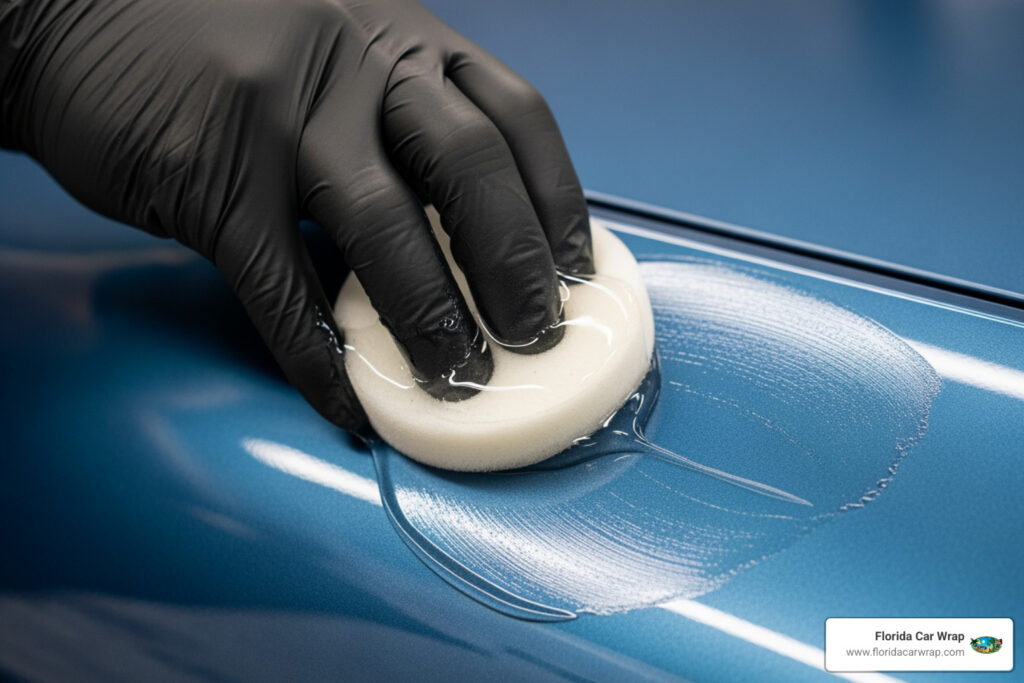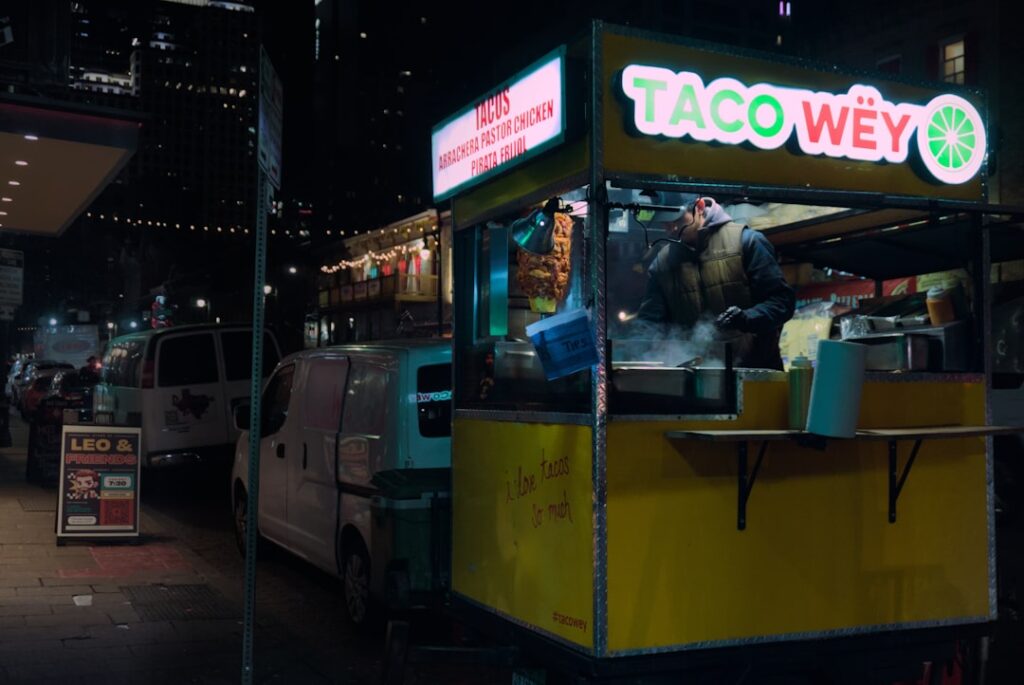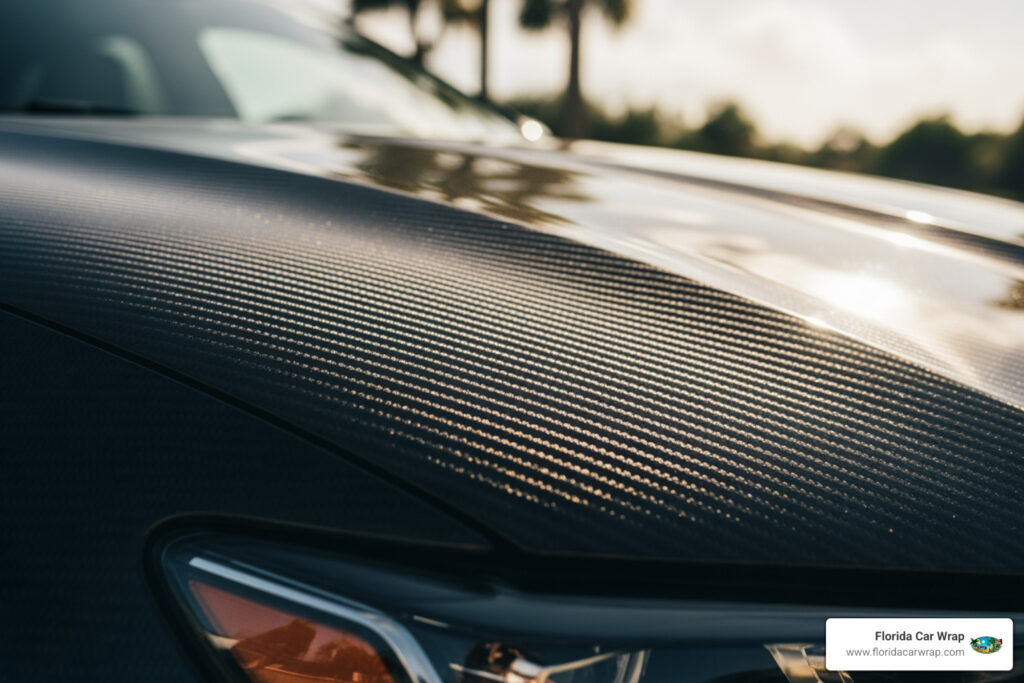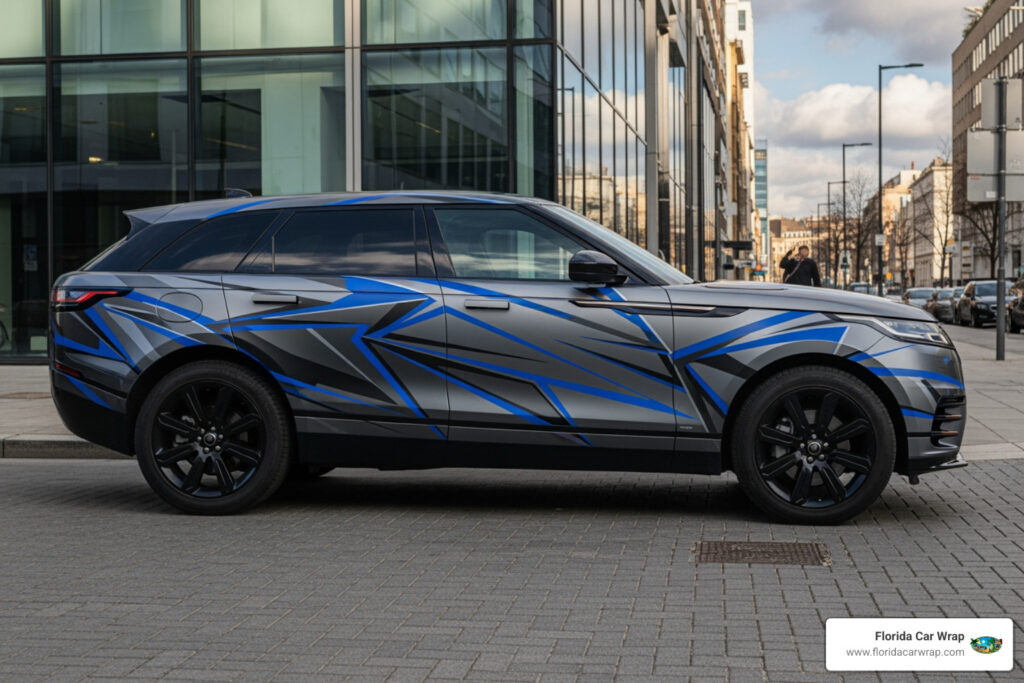Understanding Car Wrap Estimates – Your Quick Guide
Thinking about changing your ride with a vinyl wrap? Getting a good wrap car estimate is your first step toward making that change a reality. Let’s break down what you need to know in simple terms.
When it comes to wrapping your vehicle, prices vary widely based on what you’re looking for. Here’s a handy reference of what you might expect to pay:
| Vehicle Type | Partial Wrap Cost | Full Wrap Cost | Vinyl Required |
|---|---|---|---|
| Small Car/Coupe | $500-$2,000 | $2,000-$3,600 | 50-55 ft |
| Sedan | $800-$2,500 | $2,500-$4,400 | 60-65 ft |
| Small SUV | $1,000-$2,800 | $3,000-$4,640 | 65-75 ft |
| Large SUV | $1,200-$3,000 | $3,500-$5,200 | 75-90 ft |
| Pickup Truck | $1,200-$3,000 | $3,800-$6,500 | 60-125 ft |
| Cargo Van | $1,500-$3,500 | $4,000-$6,000 | 75-100 ft |
A wrap car estimate is essentially figuring out the cost of dressing your vehicle in vinyl instead of repainting it. Whether you’re a business owner wanting to turn heads with your branding, someone looking to refresh your car’s appearance, or simply protecting that factory paint job, understanding these costs helps you plan your budget.
Several factors influence your final price tag. The size of your vehicle obviously matters – wrapping a Mini Cooper costs less than wrapping a Suburban. The complexity of your design plays a big role too – simple color changes cost less than intricate graphics or custom artwork. The quality of vinyl you choose makes a difference as well, with premium brands like 3M or Avery Dennison offering better durability and finish options at a higher price point.
Want a quick DIY way to estimate how much vinyl you’ll need? Take your vehicle’s length in feet, multiply by 3 (accounting for both sides and the top), then add about 5-15 extra feet for bumpers and any mistakes. This gives you a rough idea of the vinyl footage you’ll need. Most vinyl comes in standard 5-foot wide rolls.
When it comes to installation time, professional shops typically need about 2-4 days to complete a full wrap. With proper care, your wrap can look great for 3-7 years. The labor portion of your estimate will usually run around $3-$4 per square foot on top of material costs.

Whether you’re planning to advertise your business with eye-catching graphics or just want to give your vehicle a fresh new look without the permanence of paint, a good wrap estimate sets the foundation for your project’s success. And remember, while cost is important, quality installation makes all the difference in the final result and longevity of your wrap.
Want to learn more about specific pricing details? Check out our guides on car wrap estimates and car wrap prices for a deeper dive into what influences the cost of your vehicle change.
Car Wrap 101 – Paint vs. Vinyl
When it comes to giving your ride a fresh new look, you’ve got options. While traditional paint jobs have been the go-to for decades, vinyl wraps have revolutionized the vehicle customization world. Unlike paint, which permanently changes your car’s appearance, vinyl wraps offer a reversible solution that protects your original finish underneath.
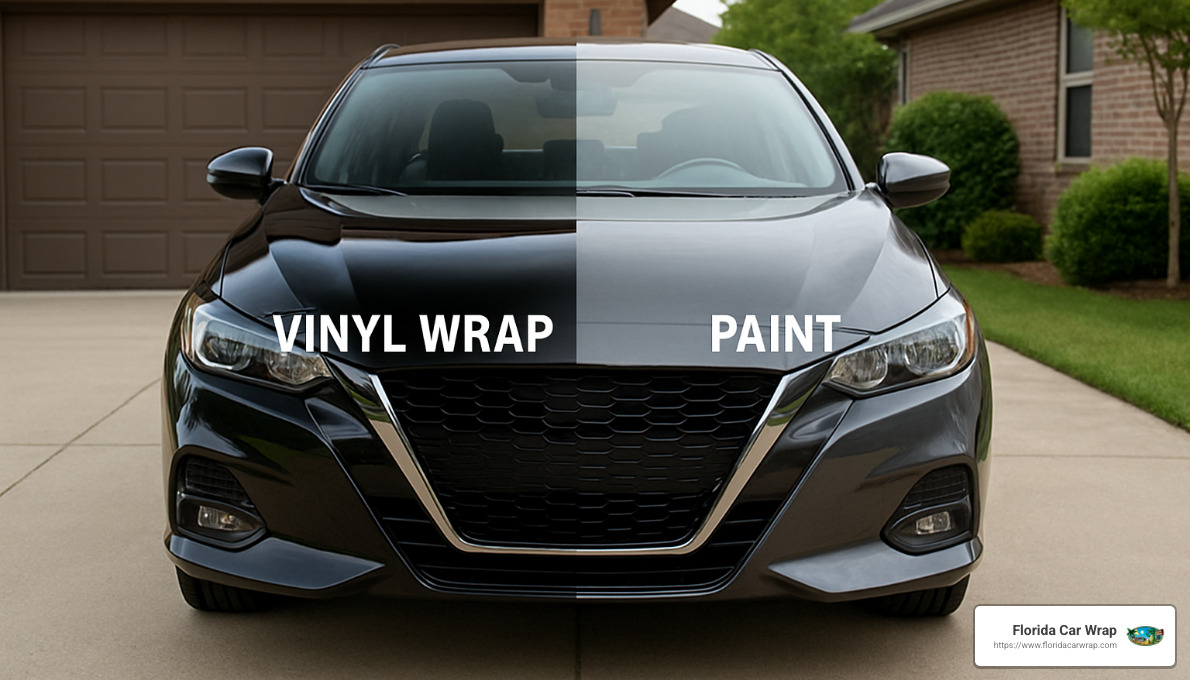
Think of vinyl wraps as a stylish, protective skin for your vehicle. These thin, adhesive-backed films adhere directly to your car’s exterior, not only changing its look but also creating a shield against everyday hazards. That morning commute through construction zones? Your wrap is taking those tiny stone chips instead of your paint. Those UV rays that would normally fade your finish over time? Your wrap is blocking them.
For business owners, the advertising power of vehicle wraps is simply unbeatable. Imagine turning your company car into a moving billboard that catches eyes everywhere you go. A professionally wrapped commercial vehicle can generate an impressive 70,000 impressions daily – that’s marketing that works for you 24/7, whether you’re making deliveries or simply parked at the grocery store.
With proper care, quality vinyl wraps typically last 3-7 years, depending on Florida’s sunshine and how well you maintain them. Premium wraps from trusted brands might even exceed this lifespan, making them a smart investment compared to budget options that deteriorate quickly in our hot climate.
More info about What is a Vinyl Wrap?
Main Benefits at a Glance
The advantages of choosing vinyl over paint go beyond just aesthetics. Your wrap acts as a UV shield against Florida’s intense sunshine, preventing the premature aging and fading of your factory paint. It also serves as a scratch barrier, taking the brunt of minor abrasions that would otherwise permanently mark your vehicle.
Perhaps the most exciting benefit is the color change flexibility – feeling bold with matte black today but might want something brighter next year? With wraps, you’re never locked into one look. The quick turn-around time is another major plus – while quality paint jobs can leave your car in the shop for weeks, most professional wraps can be completed in just 2-4 days, getting you back on the road faster.
Many of our clients are surprised to learn that wraps can actually help maintain their vehicle’s value. By preserving the original paint underneath, you’re protecting one of your car’s most important assets, especially crucial if you lease your vehicle or plan to sell it down the road.
Is Wrapping Cheaper than Painting?
When comparing your wallet’s bottom line, vinyl wrapping typically offers better value than a high-quality paint job. Let’s talk real numbers:
A full professional wrap car estimate usually falls between $2,000-$7,000+, with the final price depending on your vehicle size and design complexity. Meanwhile, quality paint jobs start around $3,500 and can easily exceed $10,000 for premium finishes and custom work.
The value equation goes beyond just the price tag. Paint jobs demand extensive preparation, multiple application stages, and long curing periods – often leaving you without wheels for 1-2 weeks. In contrast, most wraps can be completed in 2-4 days, significantly reducing your downtime.
“Though a premium vinyl wrap won’t outlast a top-tier paint job,” Steve from Florida Car Wrap explains, “the flexibility and cost savings make it the smarter choice for many of our clients, especially those who enjoy changing their vehicle’s look every few years.”
For those concerned about resale value, a quality wrap actually works in your favor by keeping the original paint pristine underneath – something potential buyers definitely appreciate when it’s time to sell or return your leased vehicle.
Key Factors that Drive Your Wrap Car Estimate
Understanding what influences the cost of your vehicle wrap is crucial for budgeting accurately. Let’s examine the primary factors that professionals consider when creating your wrap car estimate.

Vehicle Size and Surface Area
The size of your vehicle is the foundation of any wrap car estimate. It’s pretty straightforward – bigger vehicles need more vinyl and take longer to wrap. When I measure a vehicle, I’m looking at the total square footage of each panel.
A compact car might only have around 200 square feet to cover, while a standard sedan typically jumps up to about 230 square feet. SUVs, with their taller profiles and larger panels, average around 250 square feet. And those cargo vans? They’re the vinyl-hungry giants at 450+ square feet!
Every additional square foot means more material and more hands-on installation time, both of which directly impact your bottom line.
Design Complexity
The difference between a simple color change and a head-turning custom design is significant – both in visual impact and cost.
Single-color wraps are relatively straightforward, requiring less prep time and fewer vinyl cuts. But when you start adding custom graphics, multiple colors, or those eye-catching special effects, everything changes. Complex designs require more design hours, precise printing setup, and significantly more installation time as installers carefully align and apply each element.
The more intricate your vision, the more material waste typically occurs during installation too. Those complex curves and detailed cuts often mean trimming away more excess vinyl to achieve the perfect finish.
Vinyl Brand and Quality
I always tell my clients: vinyl quality is not where you want to cut corners. The difference between economy and premium brands is like night and day, especially a few years down the road.
Premium brands like 3M and Avery Dennison cost more upfront, but they offer superior durability, more consistent colors, and are actually easier to work with during installation. Economy vinyl might save you some cash initially, but often leads to earlier replacement.
In terms of pricing, economy vinyl runs about $1-1.50 per square foot, while premium vinyl costs $2-3.50 per square foot. Specialty finishes like chrome or those stunning color-shifting wraps that change with viewing angle? They’ll set you back $4-8+ per square foot.
As Steve Hargittai, owner of Florida Car Wrap, often says, “We exclusively use premium vinyl materials because they deliver better results and longer-lasting performance for our clients. The initial investment pays dividends in durability and appearance over time.”
Regional Labor Rates
Where you get your wrap installed matters almost as much as what you’re installing. Labor rates vary widely depending on your location – shops in major metropolitan areas like Miami or Fort Lauderdale typically charge more than those in smaller markets.
Professional installation is usually billed either hourly ($75-100/hour) or by square footage ($3-4 per square foot). These rates reflect the local cost of doing business and the expertise level of the installation team.
Warranties and Guarantees
Quality wrap installers stand behind their work with warranties that protect your investment. These guarantees typically cover issues like peeling, fading, or installation defects for a specific period.
While installations with extended warranties might cost more initially, they provide valuable peace of mind. Think of it as insurance – you hope you won’t need it, but you’ll be thankful to have it if problems arise.
The investment is particularly worthwhile for businesses. According to research by 3M, a well-executed wrapped vehicle can generate between 30,000-70,000 impressions daily! That’s powerful mobile marketing that works for you around the clock.
Scientific research on fleet-graphics impact
“Wrap Car Estimate” – Material Choices & Cost per Foot
The type of vinyl you select dramatically impacts your wrap car estimate. Let’s break down your options:
Cast vinyl is the premium choice – it’s thinner, more conformable to complex curves, and lasts longer (typically 5-7+ years). This quality comes at a price of $2-3.50 per square foot, but the superior performance is worth it for most vehicle owners.
Calendared vinyl is the more economical option. It’s thicker, less flexible around curves, and has a shorter lifespan of about 3-5 years. It costs less at $1-2 per square foot, making it suitable for temporary applications or budget-conscious projects.
When it comes to finishes, the world is your oyster! Standard gloss runs about $1 per 15 square inches, while matte and satin finishes cost slightly more at $1.10-1.40 per 15 square inches. For those looking to make a statement, carbon fiber looks run around $3 per 15 square inches, while chrome and color-shifting chameleon finishes range from $2-3 per 15 square inches.
Don’t forget to account for waste in your calculations. Even the most skilled installers need extra material to work around complex curves and ensure perfect alignment. Most professionals add 10-15% extra material to their estimates to accommodate this reality.
“Wrap Car Estimate” – Coverage Levels: Full vs. Partial
How much of your vehicle you choose to wrap significantly affects your wrap car estimate. You have several options:
A full wrap covers all painted exterior surfaces, changing your entire vehicle. This requires approximately 50-125 feet of vinyl (depending on vehicle size) and typically costs between $2,000-$7,000+. While it’s the most expensive option, it delivers maximum visual impact and complete protection for your factory paint.
A partial wrap covers about 25-75% of your vehicle, requiring 25-60 feet of vinyl. These strategic partial coverings range from $500-$3,000 and can be designed to maximize visual impact while keeping costs lower. Many businesses choose this option to display logos and key messaging in high-visibility areas while leaving some factory paint exposed.
Accent wraps focus on specific vehicle features. A hood wrap typically runs $250-$600, while a roof wrap costs $300-$650. Bumper wraps average $200-$500, and smaller accents like door handles or mirrors might only cost $100-$300. Racing stripes, depending on complexity, range from $150-$800.
These partial options offer an excellent middle ground if you’re working with budget constraints but still want the visual impact and benefits of vinyl. With creative design, even a partial wrap can turn heads and make your vehicle stand out from the crowd.
Measuring Your Vehicle & Calculating Vinyl Needed
Accurate measurements are crucial for a precise wrap car estimate. Whether you’re working with a professional installer or planning a DIY project, knowing how much vinyl you’ll need helps avoid costly overages or frustrating shortages.

Getting your measurements right is a bit like measuring for a custom suit – you want it to fit perfectly without wasting expensive material. Let me walk you through how to get this right the first time.
The Simple Formula Method
For a quick vinyl estimate that won’t leave you short-handed, here’s a handy formula that’s become the industry standard:
Take your vehicle’s length in feet, multiply that by 3 (this accounts for both sides and the top), then add an extra 5-15 feet for bumpers and those “oops” moments we all have.
For example, if you have a 15-foot sedan, you’d calculate: 15 feet × 3 = 45 feet, plus 10 feet buffer = 55 feet of vinyl needed.
This works beautifully because vinyl wrap typically comes in standard 5-foot (1.52m) wide rolls, which is enough to cover most vehicles’ height with a single width of material. Think of it as buying a ribbon that’s wide enough to wrap your gift in one pass.
Step-by-Step Measuring Guide
For those who prefer precision (and who doesn’t when spending hundreds on materials?), here’s how to measure like a pro:
Start with the overall length from front to rear bumper. Then measure the height from the bottom of the side skirts up to the roof. Don’t forget to separately measure your hood, roof, individual doors and fenders, the trunk/hatch, and both bumpers.
Those tricky areas like mirrors and door handles deserve special attention. They’re the equivalent of wrapping oddly-shaped Christmas gifts – you’ll need separate pieces and a bit more patience.
As Steve Hargittai at Florida Car Wrap often tells clients, “The extra fifteen minutes you spend measuring accurately can save you hundreds of dollars in wasted materials.”
Vehicle Size Categories and Typical Requirements
After wrapping thousands of vehicles, we’ve seen some patterns emerge. Here’s what you can typically expect:
For small cars like a Honda Civic or BMW 3 Series, you’ll need about 50-55 feet (15-16.8m) of vinyl. Midsize cars like the Toyota Camry or Tesla Model 3 usually require 60-65 feet (18.3-19.8m). Moving up to full-size cars or small SUVs like a BMW 5 Series or Honda CR-V, plan for 65-75 feet (19.8-22.9m). Those bigger large SUVs and trucks like the Ford F-150 or Chevy Tahoe will need 75-100 feet (22.9-30m) of material.
It’s a bit like buying fabric for clothing – better to have a little extra than come up short and find out the material is now discontinued!
Selecting Roll Sizes & Ordering Extra
When it comes time to order, vinyl typically comes in standard roll lengths of 15m (50ft), 18m (60ft), 23m (75ft), or 30m (100ft). Always round up to the next available size – if you need 57 feet, that 60-foot roll is calling your name.
If you’re new to wrapping, add at least 15-20% extra material to your calculations. Even the pros typically add 10% for overlaps, do-overs, and those tricky curved sections that can eat up material faster than you’d expect.
“It’s always better to have a little extra vinyl than to come up short in the middle of your project,” says Steve Hargittai of Florida Car Wrap. “The additional cost is minimal compared to the frustration of having to order more material and delay your installation. Not to mention, having a small piece left over is perfect for future repairs if needed.”
Having wrapped everything from compact cars to commercial box trucks, we’ve learned that careful measurement is the foundation of a successful wrap project – and the key to an accurate wrap car estimate that won’t surprise you halfway through.
Typical Pricing by Vehicle & Coverage
Wondering what your dream vehicle change might cost? Let’s break down what you can expect to pay for different vehicles and coverage options. Whether you’re wrapping a sporty coupe or a work van, these figures will help you plan your budget.

Full Wrap Pricing by Vehicle Type
When it comes to wrap car estimates, size definitely matters! Your sleek Mustang will need much less vinyl (and labor) than a massive Sprinter van.
For coupes and small cars like a Honda Civic or BMW 3 Series, expect to invest between $2,000-$3,600 for a full wrap. These smaller vehicles typically need about 50-55 feet of vinyl and take professionals 2-3 days to complete.
Moving up to sedans such as a Toyota Camry or Tesla Model 3, the price range shifts to $2,500-$4,400. These mid-sized beauties require 60-65 feet of vinyl and also take about 2-3 days for installation.
Got an SUV? Small SUVs like the Honda CR-V or Jeep Wrangler generally run $3,000-$4,640 for a full wrap, using 65-75 feet of vinyl. The installation process typically extends to 3-4 days due to their larger surface area and more complex curves.
Large SUVs like the Chevy Tahoe or Ford Explorer command $3,500-$5,200 for a complete change. These bigger vehicles need 75-90 feet of vinyl and also require 3-4 days of skilled installation work.
For pickup trucks such as the Ford F-150 or RAM 1500, prices range from $3,800-$6,500, with vinyl requirements varying dramatically (60-125 feet) depending on whether you have a standard cab, extended cab, or crew cab with different bed lengths. Most truck wraps take 3-4 days to complete.
If you’re wrapping a cargo van like a Ford Transit or Mercedes Sprinter, budget between $4,000-$6,000+. These workhorses need 75-100 feet of vinyl and can take 3-5 days to wrap properly due to their large, flat sides and complex rear door configurations.
For commercial box trucks and trailers, prices start around $5,000 and can exceed $10,000 for larger vehicles. These commercial-grade wraps might require anywhere from 100-300+ feet of vinyl and can take a full work week or more to install properly.

Partial Wrap Pricing
Not ready to commit to a full wrap? Partial wraps offer a fantastic middle ground, delivering visual impact while keeping some of your factory paint visible. They’re perfect for those with tighter budgets or who want a more subtle customization.
For small cars and coupes, partial wraps typically run $500-$2,000, using 25-40 feet of vinyl. Your sedan might cost $800-$2,500 with 30-45 feet of material. SUV owners can expect to pay $1,000-$3,000 using 35-60 feet, while trucks and vans generally range from $1,200-$3,500 with 40-75 feet of vinyl needed.
“Partial wraps are a smart way to maximize impact while minimizing cost,” says Steve Hargittai of Florida Car Wrap. “We often focus on the most visible areas of the vehicle, creating designs that flow naturally with your car’s lines.”
Time on the Rack – How Long Installation Takes
When planning your wrap project, it’s important to know how long you’ll be without your vehicle. A quality installation isn’t rushed – proper preparation and meticulous application make all the difference in the final result.
The process begins with preparation (4-8 hours), where your vehicle undergoes thorough cleaning, degreasing, and surface preparation. Think of this as the foundation – any shortcuts here will compromise the entire project.
Next comes the actual installation (1-4 days), where skilled technicians apply the vinyl panel by panel, carefully heating and stretching it around curves and complex areas. This precision work takes time, especially for full wraps with intricate designs.
Finally, there’s the curing and final inspection (24 hours), where the adhesive fully bonds to your vehicle. During this phase, technicians perform final heat treatments to remove any bubbles and conduct a thorough quality inspection.
Simple accent pieces like hood wraps or racing stripes might be completed in a single day, while full wraps on larger vehicles typically require 2-4 days of shop time. As one of our installers likes to say, “Rushing a wrap is like rushing a fine meal – the results are never satisfying.”
Design & Setup Fees
Creating a custom design for your vehicle wrap often involves additional costs beyond the basic installation. These design services transform your vision into a wrap-ready digital file.
For artwork requirements, we need high-resolution files – ideally 300 dpi minimum for any printed graphics. Vector files with specific Pantone color codes produce the best results, ensuring your colors match exactly what you envision. Your design will also need to be properly sized using templates specific to your vehicle make and model.
Design fees typically follow this structure: basic design work runs $85-$150 per hour, while complex custom designs might range from $500-$2,000+ for intricate, one-of-a-kind creations. If you need logo conversion and optimization for your business vehicle, expect to pay $100-$300 depending on complexity.
There are also setup fees to consider: digital file preparation ($50-$150), custom color matching ($100-$200), and printed proof samples ($50-$100) if you want to see exactly how your colors will look before the full installation.
Many wrap companies, including Florida Car Wrap, include basic design consultation in their packages, but always clarify what’s included in your wrap car estimate to avoid surprise charges. The investment in professional design pays dividends in the final appearance of your wrap – after all, this is your vehicle’s new public face!
Extra Costs, Removal & Maintenance
When planning your wrap car estimate, don’t forget to consider the “extras” that can affect your total investment. These additional factors might seem small at first, but they can add up quickly!
Additional Services and Their Costs
That gorgeous roof wrap you’ve been eyeing? It’s going to cost a bit extra. Smaller cars typically run $300-$400 for a roof wrap, while SUVs jump to $550-$700, and vans can reach $650-$800. It’s worth every penny for that two-tone look, though!
Window perforations are another popular add-on. These special films allow you to see out from inside while displaying graphics to the outside world. A back window treatment usually costs $200-$250, side windows run about $150-$200 each, and if you want all your windows done, expect to invest $500-$1,000.
Have you heard about ceramic coating for wraps? This premium treatment adds $1,200-$1,500 to your project, but it’s like giving your wrap a superhero shield. The ceramic layer improves gloss, provides extra UV protection, makes cleaning a breeze, and can significantly extend your wrap’s lifespan.
For those looking to modernize their ride, chrome delete packages (replacing shiny chrome trim with sleek matte or gloss black) cost between $300-$800. Want those door jambs wrapped for a seamless look when doors are open? That’ll be $300-$600. Interior trim wrapping starts around $200 and can exceed $1,000 depending on how much you want done.
Wrap Removal Costs
Nothing lasts forever, including your vehicle wrap. When it’s time for a change, you’ll need to budget for removal:
Professional removal typically costs between $500-$1,500, with most shops charging hourly rates of $85-$100. Why such a wide range? Several factors affect removal difficulty: how old the wrap is, the quality of the original installation, how much sun and weather it’s endured, and the vinyl quality itself.
As Steve Hargittai from Florida Car Wrap often tells clients, “A five-year-old wrap that’s been baking in the Florida sun will take significantly longer to remove than a two-year-old wrap that’s been garage-kept.” This is especially true with lower-quality materials that can become brittle and adhesive that can harden with age.
Maintenance Requirements and Costs
Your beautiful new wrap deserves proper care! Maintaining your wrap isn’t complicated, but it does require some specific products and techniques.
First rule: hand wash only! Automatic car washes with their harsh brushes and chemicals are wrap killers. Invest in a good pH-neutral car shampoo ($15-$30) and quality microfiber washing mitts and towels ($20-$50). Monthly cleaning keeps your wrap looking fresh and prevents buildup that can damage the vinyl.
For extra protection, ceramic boost sprays ($30-$100 annually) and UV protectants ($20-$40 per bottle) applied every 3-6 months can significantly extend your wrap’s vibrant appearance. Think of these as sunscreen for your vehicle!
“The way you maintain your wrap is just as important as the quality of the installation,” notes Steve Hargittai. “Regular gentle cleaning and avoiding harsh chemicals can double the effective lifespan of your vinyl wrap.”
More info about Car Wrap Prices
Will a Wrap Hurt or Help Resale?
Good news! A properly installed and maintained wrap can actually benefit your vehicle’s resale value.
Think of your wrap as a protective shield for your factory paint. Quality wraps defend against UV damage, minor scratches, and environmental contaminants. When the time comes to sell and the wrap is professionally removed, the original paint often looks remarkably fresh compared to unwrapped vehicles of similar age.
For leased vehicles, wraps are a perfect solution. You can enjoy a customized look without violating lease terms, since the factory color remains untouched underneath. When your lease ends, simply have the wrap professionally removed before returning the vehicle.
One satisfied customer shared: “I took the partial paint protective film application and total ceramic coating route with my new car a year ago. Granted, it was a subcompact SUV, the total cost was $1,800. A year later, it looks great.”
DIY vs. Professional Removal
While you might be tempted to remove your wrap yourself to save money, consider the risks carefully.
DIY removal requires some basic tools: a heat gun or hair dryer ($30-$100), adhesive remover ($15-$30), and plastic scrapers ($5-$10). The real cost, however, is time—expect to spend anywhere from 8 to 20+ hours depending on your vehicle and wrap condition.
The bigger concern is potential damage. Without proper technique, you risk harming your clear coat or paint, leaving stubborn adhesive residue that requires professional correction, or achieving inconsistent results, especially in complex curved areas.
Professional removal might cost more upfront, but it offers peace of mind and consistent results. This is particularly important for expensive vehicles or leased cars where paint damage could result in significant charges.
As the saying goes in the wrap industry, “The cheapest removal is one done right the first time.”
Requesting Your Quote: From Idea to Finished Wrap
Getting an accurate wrap car estimate requires clear communication with your installer. Here’s how to steer the process from initial inquiry to completed installation.

Preparing for Your Quote Request
Ready to transform your vehicle? The journey to a great wrap starts with good preparation. Think of this as the foundation for your project—the more solid it is, the smoother everything will go.
First, gather all your vehicle details. Your installer will need to know the make, model, and year of your car. Don’t forget to mention any quirks or damage that might affect the installation. Those little dings or scratches you’ve learned to ignore? They matter for a perfect wrap fit. Taking clear photos from multiple angles helps tremendously—installers can spot potential challenges before you even bring your vehicle in.
Next, consider what you really want. Are you dreaming of a full wrap that completely transforms your ride, or maybe a partial wrap that adds personality while keeping costs down? Perhaps you just want some accent elements like a roof wrap or racing stripes. The finish matters too—glossy for that wet-paint look, matte for understated elegance, or maybe something eye-catching like chrome or color-shift.
Be honest about your budget parameters. As Steve from Florida Car Wrap often tells clients, “Knowing your budget helps us tailor solutions that give you the most bang for your buck.” Share your target price range and identify which features are must-haves versus nice-to-haves. This transparency helps installers create options that respect your financial boundaries while still delivering results you’ll love.
The Consultation Process
The consultation is where your wrap dreams start taking shape. Think of it as a collaborative creative session—not just a price quote.
During the initial assessment, your installer will inspect your vehicle in person, looking for areas that might need special attention. This is the perfect time to discuss your design ideas and get expert feedback on what works best for your specific vehicle. You’ll also get to explore material options, feeling the difference between various finishes and learning about their durability.
The design development phase is where things get exciting. Your concepts will be transformed into visual mockups that show how the finished wrap will look on your actual vehicle. Many shops will provide material samples so you can see exactly how that matte black or color-shifting vinyl appears in different lighting. Don’t be afraid to ask for revisions—this is your project, and getting it right matters.
Finally, you’ll receive a final proposal with everything spelled out. A good wrap car estimate breaks down all costs clearly, specifies exactly which materials will be used, provides a realistic timeline, and explains warranty coverage. No surprises—just clear expectations.
“Clear communication from the beginning leads to better results and happier clients,” explains Steve Hargittai, who personally oversees consultations at Florida Car Wrap. This personal touch ensures you understand exactly what you’re getting before committing.
More info about Car Wrap Estimate
Online Tools & Calculators
While nothing beats a professional consultation, several digital tools can help you get ballpark figures before making that first call.
The Wrapulator offers vehicle-specific templates that help visualize and estimate material needs. For about $10 per template, you get downloadable PDFs custom-custom to your exact make and model. It’s a small investment that can prevent big misunderstandings about scope and cost.
Many wrap shops also offer square-foot calculators on their websites. These handy tools let you input your vehicle dimensions, select your desired coverage type, and choose material grades to get approximate material requirements and costs. They’re not perfect, but they help set realistic expectations.
Template libraries are another useful resource, especially for visualizing how designs will look on your specific vehicle. These pre-measured outlines help you understand where logos or graphics will appear and how much material might be needed.
Just remember—these digital tools provide helpful starting points, not definitive quotes. Your actual vehicle’s condition, design complexity, and regional labor rates will all affect the final price.
What Installers Need to Know
Professional installers are a bit like detectives—they need specific information to solve the puzzle of your perfect wrap. Being prepared with answers saves time and leads to more accurate estimates.
Have you modified your vehicle with aftermarket body kits or accessories? These changes affect how vinyl conforms to your car’s surface and how much material is needed. Similarly, information about previous wraps or paint work helps installers prepare for potential challenges.
Your factory paint condition matters tremendously. Installers need to know about peeling clear coat, deep scratches, or recent touch-ups. Modern vehicles also have various sensors and special features like panoramic roofs that require special handling during installation.
Be upfront about your timeline expectations. Need the car ready for a show next weekend? That rush job might cost more. More flexible? You might save money. Also consider seasonal factors—extreme temperatures can affect installation quality, so timing matters.
Finally, be honest about your budget constraints. A good installer can suggest creative solutions if your dreams exceed your wallet. Maybe a phased installation approach works better, or perhaps a different material can deliver similar results at a lower price point.
By sharing these details upfront, you enable installers to create accurate estimates and avoid unwelcome surprises. After all, the best wrap projects start with honesty and end with smiles.
Frequently Asked Questions about Wrap Car Estimates
How much does a full-car wrap really cost?
When clients ask about pricing for a complete vehicle change, I always explain that a full-car wrap is an investment that typically ranges between $2,000 and $7,000+ for professional installation with quality materials.
The price varies significantly based on your vehicle type. Smaller cars like coupes and compacts usually start around $2,000-$3,600, while mid-size vehicles like sedans fall in the $2,500-$4,400 range. If you’re driving a larger SUV, truck, or van, expect to invest $3,500-$6,500 or more. And if you’re dreaming of those head-turning specialty finishes like color-shifting chameleon effects or mirror chrome, you’ll land toward the higher end of these ranges.
“While car wrapping may seem ‘so expensive’ because of the cost of materials and labor, when you take into account customization and value, it’s really quite reasonable!” explains Steve Hargittai. This becomes especially apparent when comparing to quality paint jobs, which often start at $3,500 and can easily exceed $10,000.
What’s included in these prices? Typically, you’re getting professional design work, premium vinyl materials that will last for years, and skilled installation by certified technicians. Budget options do exist, but as with most things in life, you generally get what you pay for in terms of durability, appearance, and longevity.
How many feet of vinyl will my SUV need?
SUV owners often wonder exactly how much material their vehicle will require. For most SUVs, you’ll need approximately 65-90 feet of vinyl for a complete wrap, with the specific amount depending on your vehicle’s size and model.
Smaller SUVs like the Honda CR-V or Toyota RAV4 typically require 65-75 feet of vinyl, while larger models such as the Chevrolet Tahoe or Ford Expedition might need 75-90 feet or more.
For a personalized calculation, here’s a simple formula we use at Florida Car Wrap:
- Measure your SUV’s length in feet
- Multiply that length by 3 (this accounts for both sides and the top)
- Add 10-15 feet for bumpers, complex curves, and potential mistakes
Let’s look at a real-world example: For a Ford Explorer measuring 16.5 feet in length, you would need approximately 16.5 × 3 = 49.5 feet as your base requirement. Adding a 15-foot buffer brings you to 64.5 feet, which you’d round up to the next standard roll size of 65 or 75 feet.
Vinyl typically comes in 5-foot wide rolls, so your calculations should focus on the linear footage needed rather than square footage.
What happens if I need the wrap removed later?
Life changes, and you might eventually want to return to your original paint or try a different wrap design. Professional wrap removal is a straightforward process when performed correctly, though it does involve additional costs worth considering from the start.
Most reputable shops charge between $500-$1,500 for complete wrap removal, typically billed at an hourly rate of $85-$100. The exact cost depends on several factors: the age and condition of your wrap, the quality of the original vinyl used, environmental exposure (particularly sun damage, which makes removal more difficult), and your vehicle’s size and complexity.
Here’s the good news: When properly removed by professionals, quality vinyl wraps should leave your original paint intact—sometimes even in better condition than similarly aged unwrapped vehicles! This happens because the wrap acts as a protective barrier against UV rays and minor scratches during its lifespan.
If you’re driving a leased vehicle, removing the wrap before return is essential to avoid penalties. I always recommend budgeting for removal costs when planning your initial wrap project, especially if you have a known timeframe for ownership.
While DIY removal is technically possible, it comes with significant risks. Without proper tools and techniques, you might damage the underlying paint or clear coat. If your vehicle is valuable or leased, professional removal is strongly recommended to preserve your investment.
More info about Car Wrap Prices
Conclusion
Feeling a bit overwhelmed by all this car wrap information? Don’t worry – that’s completely normal! Understanding what goes into your wrap car estimate isn’t just about numbers – it’s about helping you make choices that get you the look you want at a price that works for your budget.
Think about it like planning a home renovation. At first, the options seem endless and the prices vary wildly. But once you understand what drives the costs – the size of your vehicle, the type of vinyl you choose, how much of your car you want covered – suddenly everything makes more sense.
Whether you’re wrapping your car to make it stand out in a parking lot, protect that factory paint, or turn your work vehicle into a moving billboard, the fundamentals remain the same. The key is finding the right balance between your vision and your budget.
Here at Florida Car Wrap, we’ve built our reputation on honest pricing and taking the time to educate our clients. When you work with us, you’re benefiting from Steve Hargittai’s 20+ years of hands-on experience. Steve personally oversees projects from the initial design conversation through installation and beyond – it’s why we can confidently offer our 100% satisfaction guarantee on every job we complete.
For our neighbors throughout South Florida – from Davie to Fort Lauderdale to Miami and everywhere in between – we’re here to provide wrap services custom specifically to your needs. Our team takes genuine pride in changing your ideas into reality using only premium materials and meticulous attention to detail in every installation.
More info about getting your vehicle wrapped in Broward
Ready to see what’s possible for your vehicle? Let’s talk! Contact us today to request your personalized wrap car estimate and find how we can help you achieve exactly the look you’re imagining. With Florida Car Wrap, you’re not just getting a service – you’re gaining a partner who’s committed to your complete satisfaction from that first conversation all the way to the moment you drive away in your newly transformed vehicle.

